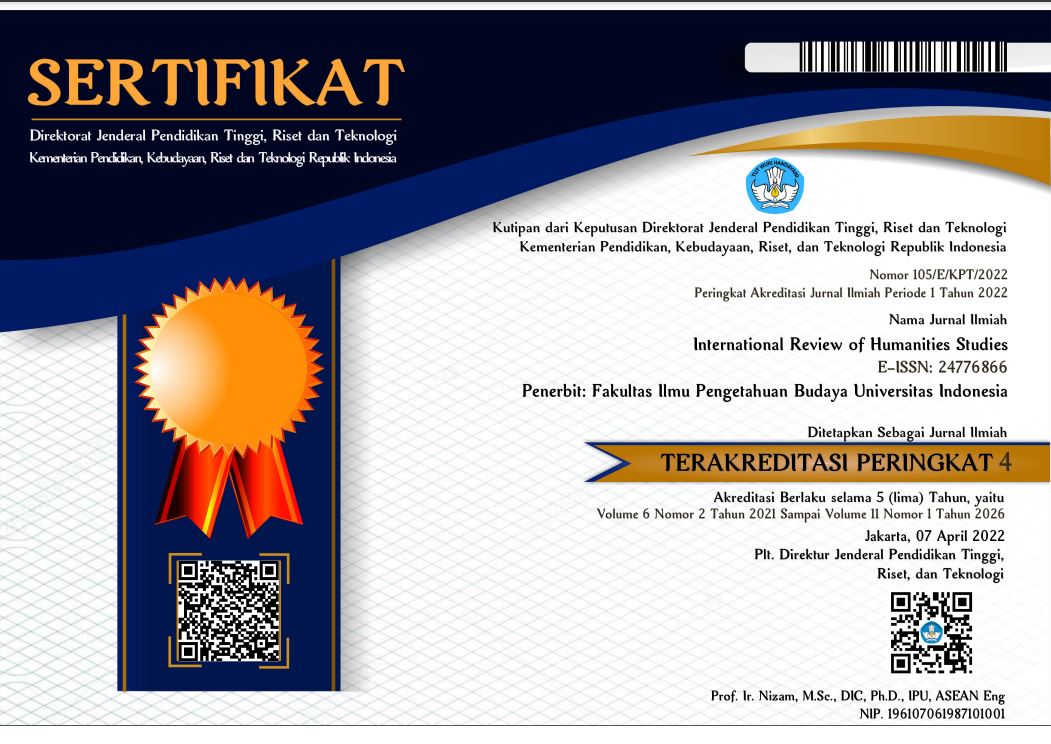International Review of Humanities Studies

Abstract
Both Thailand and Laos are predominantly Buddhist countries, following Theravada Buddhism. Influenced by Indian Buddhism, both countries celebrate several similar festivals, such as Songkran, Makha Bucha, Visakha Bucha, and Vixakha Souvana. Among all these celebrations, Songkran is considered the most lively, and this is the focus of this article. The article compares and analyzes the culture of Songkran in Laos and Thailand, including the festival's themes, cultural significance, and activities, to highlight the similarities and differences between the two. The cultural significance found in the Water Festival primarily stems from Indian cultural influences, while the differences in meaning are attributed to the adoption of Hindu culture after it entered Thailand and Laos. In the process of integration with local culture, the festival forms a unique cultural significance. By comparing the same festival, this article reveals differences and similarities in their cultural meanings, enhancing understanding of both cultures and contributing to friendly cultural exchange between the two countries.
References
Agarwal, R. (2009). Water Festivals of Thailand: The Indian Connection. In Silpakorn University International Journal (Vol. 9, Issue 10).
Best of the world 4k. (2022, April 27). Watering Buddha ceremony in Laos. Https://Youtu.Be/A4mISwUnIHk?Si=dxQ6oLJpYAOkrtYL.
Best of the world 4k. (2023, April 17). Traditional ceremony in Luang prabang . Https://Youtu.Be/DdcZG2Nb-Js?Si=zkOhmwEEFMZRUnXk.
Chinese culture for children. (2021, January 14). Section 3: Thailand Water Festival. Https://Youtu.Be/Vqo3mJbwZCY?Si=YgyujSSEeJh12sxr.
Chu J. (2010). The Making of a Tradition:How the Dai’s Water-splashing Festival Came to be Rein-terpreted as a New Year Festival. Open Times, 100–114.
Hei Xiong V Thai Guo. (2022, April 22). Thai New Year Songkran Customs. https://Youtu.Be/UT6y1HqM50Q?Si=xdQBfyvm7Ef4BVtx.
Kislenko, A. (2004). Culture and customs of Thailand. Bloomsbury Publishing USA.
Lao, L. N. Y. P. M. (2021). The Significance of Boun Pi Mai. 19–23. LNTV ENGLISH NEWS. (2015, April 17).
Lao New Year in preserves traditional Pi Mai customs.
https://Youtu.Be/XyKHP8qRDiM?Si=vcUXrzuTieeb-VvT.
LNTV English News. (2015, April 17). Lao news on LNTV: Lao New Year in preserves traditional Pi Mai customs.16/4/2015.
https://Youtu.Be/XyKHP8qRDiM?Si=rk8DQfotlE-C_6CY.
Magical Thailand. (2010, April 7). History of Songkran.
Https://Youtu.Be/Gj0RiebBNdA?Si=QLSQuMQTkmfCfJVD.
Non-Profit Organization. (n.d.). Lao American Coalition Lao New Year-Pi Mai Lao The Significance of Boun Pi Mai. www.laoamericancoalition.org
Pholsena, V. (2006). Post-war Laos: The politics of culture, history and identity. Institute of Southeast Asian Studies.
Rachelle M.Scott. (2020). Sacred Waters: A Cross-Cultural Compendium of Hallowed Springs and Holy Wells. Sacred Waters: A Cross-Cultural Compendium of Hallowed Springs and Holy Wells.
Rehbein, B. (2007). Globalization, culture and society in Laos. Routledge, (Vol. 10)., 36– 41.
Sun, L. (2014). Investigating Qualitative Analysis in Pragmatic Research, Theory and Practice of Foreign Language Teaching. Edition 2.
Tai Guo Lv Xing. (2023a, April 14). Chiang Mai Water Festival, Thailand. https://Youtu.Be/GFzcrz-4wS0?Si=xZEgRX3HhPyP799f.
Tai Guo Lv Xing. (2023b, April 20). Traditional Rituals in Temples.
https://Youtu.Be/RuIppJp8gYc?Si=oOCYt8MVDYxslAir.
Wang, G.-Y. (2016). Water-Splashing Festival of the Dai. China’s Ethnic Groups, 02, 80–82. Wang, Y. (n.d.). The Songkran Festival in Thailand and its Cultural Connotations.
Recommended Citation
Lin, Tang and Darmoko, Darmoko
(2024)
"COMPARISON OF THE RELIGIOUS MEANING OF WATER FESTIVALS IN THAILAND AND LAOS,"
International Review of Humanities Studies: Vol. 9:
No.
1, Article 4.
DOI: 10.7454/irhs.v9i1.1271
Available at:
https://scholarhub.ui.ac.id/irhs/vol9/iss1/4
Included in
Anthropology Commons, Art and Design Commons, Creative Writing Commons, Cultural Heritage Law Commons, Education Law Commons, Film and Media Studies Commons, History Commons, Intellectual Property Law Commons, International and Area Studies Commons, Legal Writing and Research Commons, Linguistics Commons, Museum Studies Commons, Philosophy Commons, Urban Studies and Planning Commons


